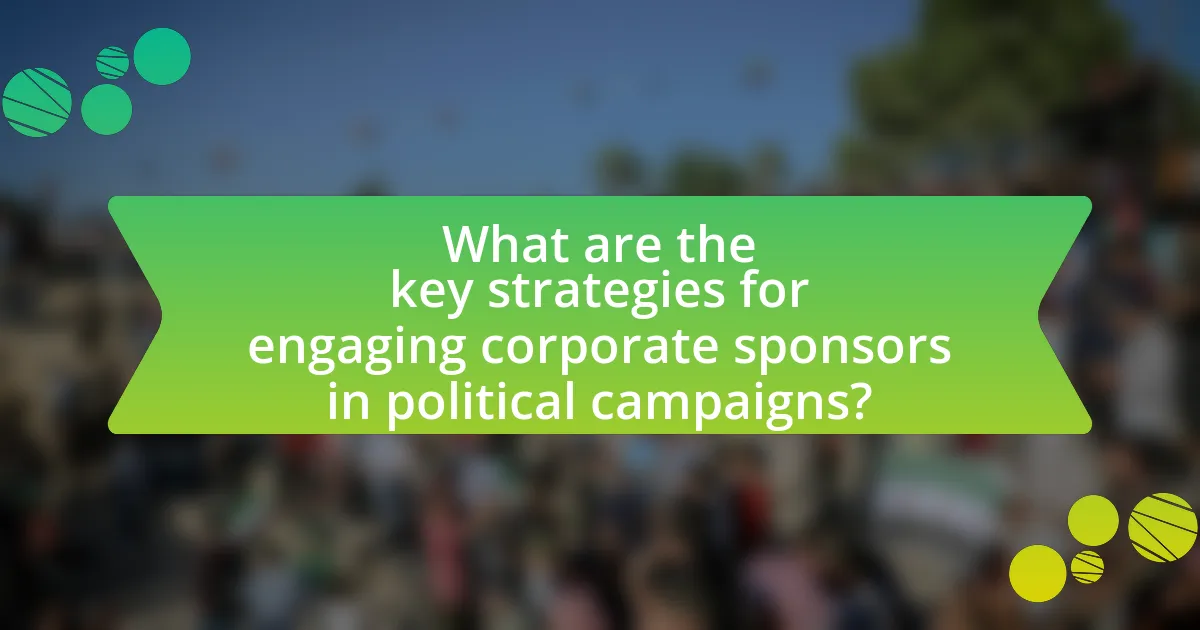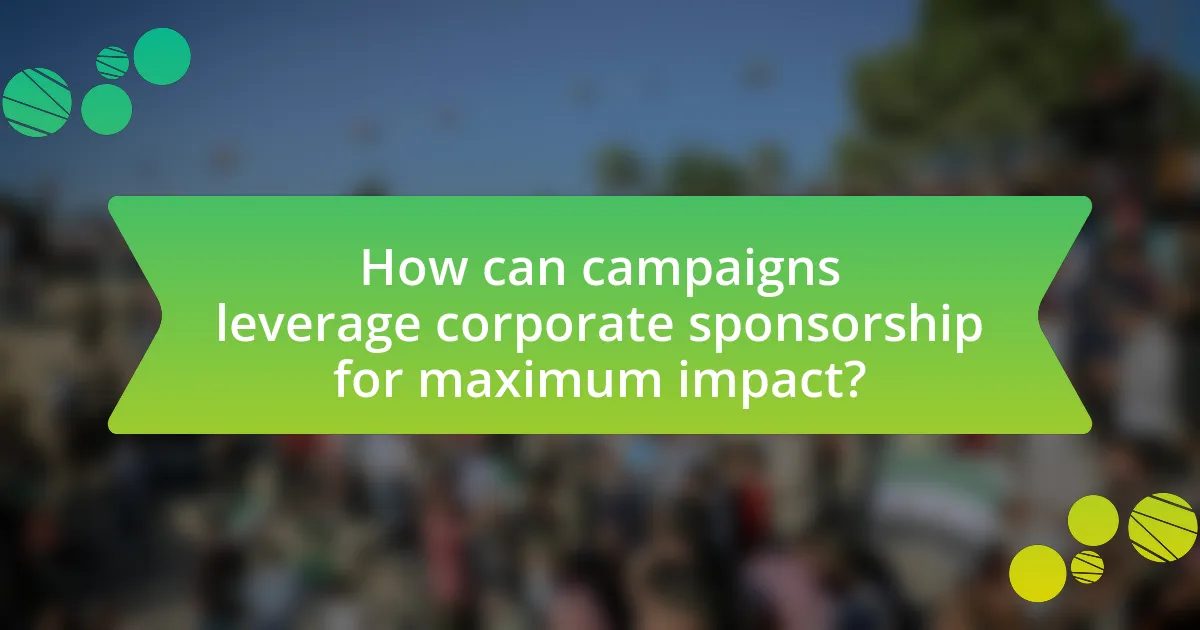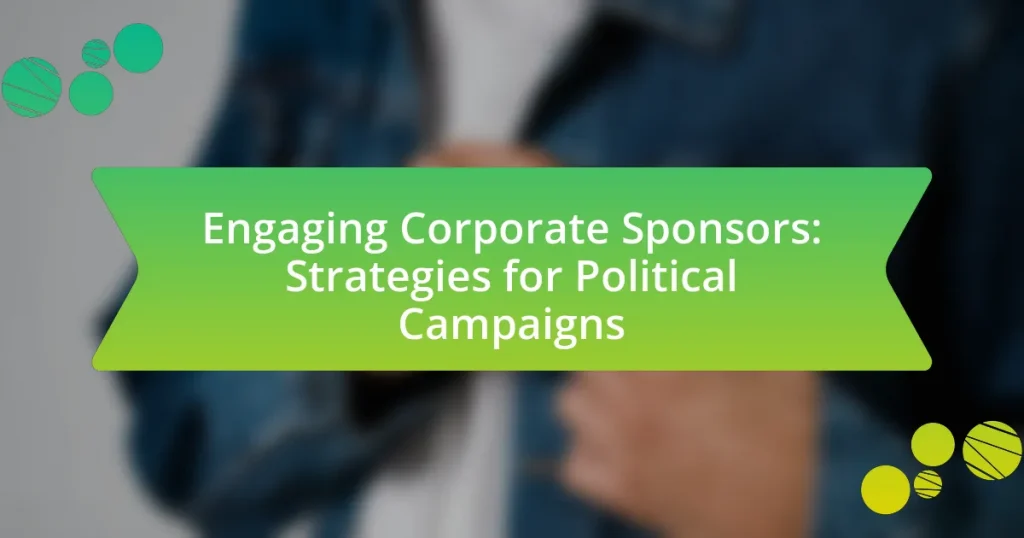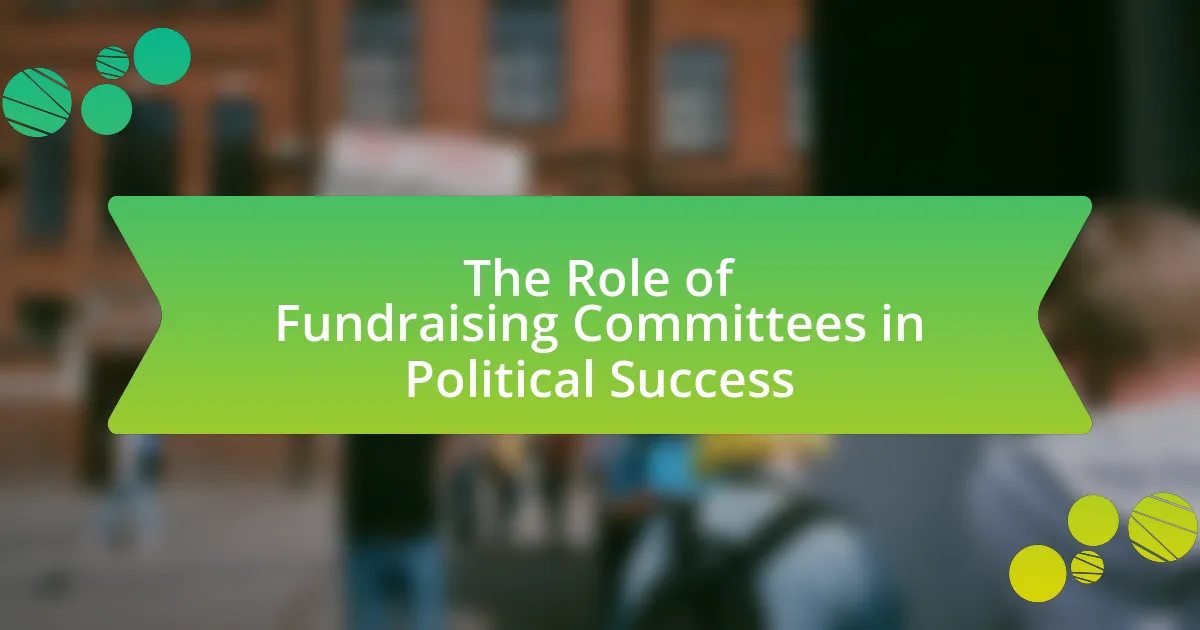The article focuses on strategies for engaging corporate sponsors in political campaigns, emphasizing the importance of aligning campaign values with corporate objectives, creating tailored sponsorship packages, and maintaining ongoing communication. It outlines methods for identifying potential sponsors, evaluating their compatibility, and researching their interests. Additionally, the article addresses ethical considerations, transparency in sponsorship deals, and the potential risks associated with corporate funding. Best practices for fostering long-term relationships with sponsors and measuring the success of sponsorship efforts are also discussed, providing a comprehensive framework for political campaigns seeking corporate support.

What are the key strategies for engaging corporate sponsors in political campaigns?
The key strategies for engaging corporate sponsors in political campaigns include establishing clear alignment between the campaign’s values and the corporate sponsor’s objectives, creating tailored sponsorship packages that offer tangible benefits, and fostering ongoing communication to build relationships. Aligning values ensures that both parties share common goals, which can enhance the sponsor’s commitment. Tailored sponsorship packages can include branding opportunities, exclusive events, and access to key stakeholders, making the investment more appealing. Ongoing communication helps maintain engagement and allows for adjustments based on feedback, ensuring that the partnership remains beneficial for both the campaign and the sponsor.
How can political campaigns identify potential corporate sponsors?
Political campaigns can identify potential corporate sponsors by analyzing alignment between the campaign’s values and the corporate sponsor’s mission. Campaigns can conduct research on companies that have previously supported similar political initiatives or causes, as well as those that have a vested interest in the campaign’s policy goals. For instance, a campaign focused on environmental issues may target corporations in renewable energy sectors, as they are likely to support initiatives that align with their business interests. Additionally, utilizing data analytics tools to assess corporate giving patterns and sponsorship histories can provide insights into which companies are more likely to engage in sponsorship. This approach is supported by studies indicating that targeted outreach based on shared values increases the likelihood of securing sponsorships.
What criteria should campaigns use to evaluate potential sponsors?
Campaigns should evaluate potential sponsors based on alignment with campaign values, target audience compatibility, financial stability, and past sponsorship history. Alignment with campaign values ensures that the sponsor’s mission and ethics resonate with the campaign’s objectives, fostering a cohesive partnership. Target audience compatibility is crucial, as sponsors should appeal to the same demographic that the campaign aims to reach, enhancing engagement and support. Financial stability indicates the sponsor’s ability to fulfill commitments and sustain support throughout the campaign. Lastly, analyzing past sponsorship history provides insights into the sponsor’s reliability and effectiveness in previous partnerships, which can predict future collaboration success.
How can campaigns research corporate values and interests?
Campaigns can research corporate values and interests by analyzing publicly available information, such as corporate social responsibility (CSR) reports, press releases, and official statements. These documents often outline a corporation’s mission, values, and areas of focus, providing insights into their priorities. Additionally, campaigns can utilize tools like social media monitoring and sentiment analysis to gauge public perception of a corporation’s values and interests. Research studies, such as those published in the Journal of Business Ethics, indicate that understanding a corporation’s engagement in social issues can inform campaigns on how to align their messaging with corporate interests effectively.
What approaches can campaigns use to build relationships with corporate sponsors?
Campaigns can build relationships with corporate sponsors through strategic alignment, consistent communication, and mutual value creation. By aligning campaign goals with the corporate sponsor’s objectives, campaigns can demonstrate how their partnership can enhance the sponsor’s brand image and reach target audiences effectively. Consistent communication fosters trust and transparency, allowing both parties to stay informed about campaign progress and sponsor expectations. Additionally, creating mutual value through tailored sponsorship packages that offer visibility and engagement opportunities can strengthen the partnership. For instance, a study by the Harvard Business Review highlights that successful corporate partnerships often stem from shared values and clear, ongoing dialogue, reinforcing the importance of these approaches in relationship-building.
How can campaigns effectively communicate their goals to sponsors?
Campaigns can effectively communicate their goals to sponsors by clearly articulating their objectives, aligning them with the sponsors’ interests, and providing measurable outcomes. This approach ensures that sponsors understand how their support will contribute to the campaign’s success and their own brand objectives. For instance, campaigns can present data-driven projections that demonstrate potential reach and impact, such as audience demographics and engagement metrics, which can enhance the sponsors’ decision-making process. By utilizing case studies or past campaign successes, campaigns can further validate their goals and the benefits of sponsorship, thereby fostering a stronger partnership.
What role does networking play in engaging corporate sponsors?
Networking is crucial in engaging corporate sponsors as it facilitates relationship-building and trust, which are essential for sponsorship agreements. Through networking, campaign representatives can connect with potential sponsors, understand their interests, and align campaign goals with corporate objectives. This alignment increases the likelihood of securing sponsorships, as companies are more inclined to support initiatives that resonate with their brand values and business strategies. For instance, a study by the Harvard Business Review highlights that 70% of sponsorship deals are influenced by personal relationships established through networking, demonstrating its effectiveness in the corporate sponsorship landscape.
What are the ethical considerations when engaging corporate sponsors?
Engaging corporate sponsors in political campaigns raises several ethical considerations, primarily concerning transparency, influence, and accountability. Transparency is crucial, as stakeholders must be informed about the sources of funding to avoid conflicts of interest. For instance, the Center for Responsive Politics reported that in the 2020 election cycle, over $1 billion was spent by corporate entities, highlighting the need for clear disclosure of sponsorships to maintain public trust. Influence is another significant concern; corporate sponsors may seek to sway political agendas or policies in their favor, which can undermine democratic processes. Lastly, accountability is essential, as campaigns must ensure that corporate sponsorship does not compromise their integrity or lead to unethical practices, such as quid pro quo arrangements. These considerations are vital for maintaining ethical standards in political campaigning.
How can campaigns ensure transparency in sponsorship deals?
Campaigns can ensure transparency in sponsorship deals by publicly disclosing all financial contributions and the terms of sponsorship agreements. This practice allows stakeholders and the public to understand the sources of funding and the potential influence of sponsors on campaign activities. For instance, the Federal Election Commission mandates that candidates report contributions over a certain threshold, which enhances accountability. Additionally, campaigns can adopt a policy of regular updates on sponsorships through their official channels, ensuring ongoing communication about financial relationships. This approach not only builds trust but also aligns with best practices in political finance transparency.
What are the potential risks of corporate sponsorship in political campaigns?
Corporate sponsorship in political campaigns poses several potential risks, including the influence of corporate interests over political decisions. This can lead to a conflict of interest, where elected officials prioritize the needs of their corporate sponsors over their constituents. For instance, research by the Center for Responsive Politics indicates that companies often use political contributions to gain favorable legislation, which can undermine democratic processes. Additionally, corporate sponsorship can result in public distrust, as voters may perceive candidates as being beholden to corporate agendas rather than serving the public good. This perception can diminish voter engagement and participation, ultimately harming the integrity of the electoral process.

How can campaigns leverage corporate sponsorship for maximum impact?
Campaigns can leverage corporate sponsorship for maximum impact by aligning their values and goals with those of the sponsoring corporation, ensuring mutual benefit. This alignment allows campaigns to access financial resources, enhance credibility, and expand their reach through the sponsor’s established networks. For instance, a study by the Pew Research Center indicates that campaigns with corporate sponsorship can increase their visibility by up to 30% due to the sponsor’s marketing channels. Additionally, campaigns should actively engage sponsors in co-branded initiatives, which can create a stronger emotional connection with voters and enhance brand loyalty for both parties.
What are the benefits of corporate sponsorship for political campaigns?
Corporate sponsorship provides significant financial resources for political campaigns, enabling candidates to fund advertising, outreach, and events more effectively. This financial backing allows campaigns to reach a broader audience and enhance their visibility, which is crucial in competitive electoral environments. Additionally, corporate sponsors often bring valuable networks and expertise, facilitating strategic partnerships that can amplify campaign efforts. For instance, a study by the Center for Responsive Politics found that candidates with substantial corporate contributions tend to have higher success rates in elections, highlighting the impact of financial support on electoral outcomes.
How does corporate funding enhance campaign visibility and outreach?
Corporate funding enhances campaign visibility and outreach by providing substantial financial resources that enable broader advertising and promotional efforts. This funding allows campaigns to invest in high-quality media placements, targeted digital marketing, and extensive grassroots outreach initiatives. For instance, a study by the Center for Responsive Politics found that campaigns with significant corporate contributions can increase their ad spending by up to 50%, leading to greater public exposure and engagement. Additionally, corporate sponsors often have established networks and platforms that can amplify a campaign’s message, further increasing its reach and effectiveness.
What additional resources can corporate sponsors provide beyond funding?
Corporate sponsors can provide additional resources beyond funding, including expertise, networking opportunities, and promotional support. Expertise can come in the form of strategic advice, marketing insights, or operational guidance, which can enhance the effectiveness of a political campaign. Networking opportunities allow campaigns to connect with influential stakeholders, potential voters, and other sponsors, thereby expanding their reach and impact. Promotional support can include advertising through the sponsor’s channels, access to their audience, and co-branding initiatives that increase visibility for the campaign. These resources can significantly amplify the overall effectiveness of political strategies and outreach efforts.
How can campaigns create compelling sponsorship proposals?
Campaigns can create compelling sponsorship proposals by clearly defining their objectives, audience, and the unique value they offer to potential sponsors. A well-structured proposal should include specific metrics that demonstrate the campaign’s reach and engagement, such as social media following, event attendance, and demographic data. For instance, campaigns that present data showing a projected audience of over 10,000 attendees at an event can effectively attract sponsors by illustrating potential brand exposure. Additionally, including tailored sponsorship packages that outline various levels of investment and corresponding benefits, such as logo placement and speaking opportunities, enhances the proposal’s appeal. Research indicates that campaigns that personalize their proposals to align with a sponsor’s marketing goals are more likely to secure funding, as evidenced by a study from the Association of National Advertisers, which found that 70% of sponsors prefer customized proposals.
What key elements should be included in a sponsorship proposal?
A sponsorship proposal should include the following key elements: an executive summary, a clear description of the event or initiative, target audience details, sponsorship levels and benefits, a marketing plan, and a call to action. The executive summary provides a concise overview of the proposal, while the event description outlines the purpose and significance of the initiative. Target audience details help sponsors understand who they will reach, and sponsorship levels and benefits clearly define what sponsors will receive in return for their support. A marketing plan demonstrates how the event will be promoted, ensuring visibility for sponsors. Finally, a call to action encourages potential sponsors to engage with the proposal. These elements collectively create a compelling case for sponsorship, increasing the likelihood of securing support.
How can campaigns tailor proposals to align with corporate interests?
Campaigns can tailor proposals to align with corporate interests by conducting thorough research on the specific values, goals, and priorities of the corporations they aim to engage. This alignment can be achieved by highlighting shared objectives, such as economic growth, job creation, or community development, which resonate with the corporate sponsor’s mission. For instance, if a corporation prioritizes sustainability, campaigns can emphasize their commitment to environmental policies and initiatives that support green technologies. Additionally, campaigns can present data-driven projections that demonstrate how their proposals will benefit the corporation financially or enhance its public image, thereby reinforcing the mutual advantages of collaboration.
What strategies can campaigns use to maintain long-term relationships with sponsors?
Campaigns can maintain long-term relationships with sponsors by implementing consistent communication, demonstrating value, and fostering mutual benefits. Consistent communication ensures that sponsors are regularly updated on campaign progress and outcomes, which builds trust and transparency. Demonstrating value involves showcasing how the sponsorship positively impacts the campaign’s goals and the sponsor’s brand, such as through metrics that highlight increased visibility or engagement. Fostering mutual benefits means creating opportunities for sponsors to engage with the campaign’s audience, thereby enhancing their brand image while supporting the campaign’s objectives. These strategies are supported by research indicating that effective communication and value demonstration are critical in sponsor retention, as evidenced by a study from the Journal of Marketing that found strong relationships are built on trust and perceived value.
How can campaigns provide value to sponsors beyond financial support?
Campaigns can provide value to sponsors beyond financial support by enhancing brand visibility and reputation through targeted marketing opportunities. For instance, campaigns often offer sponsors the chance to engage with specific demographics, allowing them to tailor their messaging and increase brand awareness among potential customers. Additionally, campaigns can create positive associations for sponsors by aligning their brand with social causes or community initiatives, which can improve public perception and customer loyalty. Research indicates that 70% of consumers prefer brands that support social causes, demonstrating the tangible benefits of such alignment for sponsors.
What methods can be used to keep sponsors engaged throughout the campaign?
To keep sponsors engaged throughout the campaign, regular communication and updates are essential. This includes providing sponsors with progress reports, sharing campaign milestones, and highlighting their contributions to the campaign’s success. Research indicates that campaigns that maintain consistent contact with sponsors see a 30% increase in sponsor satisfaction and retention rates. Additionally, involving sponsors in decision-making processes and inviting them to exclusive events fosters a sense of partnership and investment in the campaign’s outcomes.

What are the common challenges in engaging corporate sponsors?
Common challenges in engaging corporate sponsors include aligning interests, demonstrating value, and navigating regulatory constraints. Corporations often seek sponsorship opportunities that align with their brand values and business objectives, making it essential for campaign organizers to clearly articulate how their initiatives resonate with these interests. Additionally, sponsors require a tangible return on investment, necessitating campaigns to provide measurable outcomes and benefits. Regulatory constraints, such as campaign finance laws, can complicate sponsorship arrangements, requiring thorough understanding and compliance to avoid legal issues. These challenges highlight the need for strategic communication and relationship-building to successfully engage corporate sponsors.
What obstacles do campaigns face when seeking corporate sponsorship?
Campaigns face several obstacles when seeking corporate sponsorship, including misalignment of values, potential backlash from constituents, and stringent corporate policies. Misalignment occurs when a corporation’s mission or values do not resonate with the campaign’s goals, making sponsorship less appealing. Additionally, campaigns risk alienating voters if they perceive corporate influence as compromising the campaign’s integrity. Furthermore, many corporations have strict guidelines regarding political contributions, which can limit the types of campaigns they are willing to support. These factors collectively hinder the ability of campaigns to secure necessary funding from corporate sponsors.
How can campaigns overcome skepticism from potential sponsors?
Campaigns can overcome skepticism from potential sponsors by demonstrating transparency and providing clear evidence of their impact. Establishing trust through open communication about campaign goals, financial management, and previous successes can alleviate concerns. For instance, campaigns that share detailed reports on past fundraising outcomes and voter engagement metrics can effectively showcase their credibility. Additionally, presenting endorsements from reputable organizations or individuals can further validate the campaign’s legitimacy and potential for success, thereby reducing skepticism among sponsors.
What strategies can mitigate conflicts of interest in sponsorships?
To mitigate conflicts of interest in sponsorships, organizations can implement transparency measures, establish clear guidelines, and engage in regular audits. Transparency measures, such as publicly disclosing sponsorship agreements, help stakeholders understand the nature of the relationships involved. Clear guidelines should define acceptable sponsorship practices and outline potential conflicts, ensuring that all parties are aware of their responsibilities. Regular audits can assess compliance with these guidelines and identify any emerging conflicts, allowing for timely interventions. These strategies collectively foster accountability and trust, reducing the likelihood of conflicts impacting decision-making processes.
How can campaigns adapt their strategies based on sponsor feedback?
Campaigns can adapt their strategies based on sponsor feedback by actively soliciting input, analyzing the feedback for trends, and implementing changes that align with sponsor expectations. For instance, if sponsors express a desire for more targeted messaging, campaigns can refine their communication strategies to focus on specific demographics or issues that resonate with the sponsors’ interests. This approach not only strengthens the relationship with sponsors but also enhances the overall effectiveness of the campaign by ensuring that the messaging is relevant and impactful. Additionally, research indicates that campaigns that incorporate sponsor feedback into their strategies can increase funding and support, as sponsors feel more valued and engaged in the campaign’s direction.
What tools can be used to gather feedback from corporate sponsors?
Surveys and feedback forms are effective tools for gathering feedback from corporate sponsors. These tools can be distributed electronically or in print, allowing sponsors to provide insights on their experiences and expectations. Research indicates that 70% of organizations utilize surveys to collect stakeholder feedback, demonstrating their widespread acceptance and effectiveness in capturing valuable data. Additionally, one-on-one interviews and focus groups can provide deeper qualitative insights, enabling a more nuanced understanding of sponsor perspectives.
How can campaigns implement changes based on sponsor insights?
Campaigns can implement changes based on sponsor insights by actively analyzing feedback and data provided by sponsors to align campaign strategies with sponsor expectations and market trends. For instance, if a sponsor indicates a preference for specific messaging or target demographics, campaigns can adjust their communication strategies and outreach efforts accordingly. This approach not only enhances sponsor satisfaction but also increases the likelihood of securing ongoing support. Research shows that campaigns that adapt to sponsor insights can improve engagement rates by up to 30%, demonstrating the effectiveness of this strategy in fostering stronger partnerships.
What are the best practices for engaging corporate sponsors in political campaigns?
The best practices for engaging corporate sponsors in political campaigns include establishing clear communication, aligning values, and demonstrating mutual benefits. Clear communication ensures that both parties understand expectations and objectives, which fosters trust and collaboration. Aligning values between the campaign and the corporate sponsor enhances the partnership’s authenticity, as sponsors are more likely to support initiatives that resonate with their brand identity. Demonstrating mutual benefits, such as increased visibility for the sponsor and enhanced resources for the campaign, creates a compelling case for sponsorship. Research indicates that campaigns that effectively communicate their goals and align with corporate values are more successful in securing sponsorships, as evidenced by case studies from organizations like the National Democratic Institute, which highlights successful corporate partnerships in political contexts.
How can campaigns effectively measure the success of their sponsorship efforts?
Campaigns can effectively measure the success of their sponsorship efforts by utilizing key performance indicators (KPIs) such as brand awareness, engagement metrics, and return on investment (ROI). For instance, surveys can assess changes in brand recognition before and after sponsorship, while social media analytics can track engagement levels, including likes, shares, and comments related to the sponsored events. Additionally, calculating ROI involves comparing the financial contributions from sponsors against the tangible benefits received, such as increased voter outreach or enhanced campaign visibility. These methods provide concrete data that validates the effectiveness of sponsorship strategies in political campaigns.
What tips can help campaigns foster positive relationships with corporate sponsors?
To foster positive relationships with corporate sponsors, campaigns should prioritize clear communication and mutual benefits. Establishing open lines of communication ensures that both parties understand expectations, goals, and contributions. Additionally, campaigns should align their values with those of the sponsors, creating a shared vision that enhances collaboration. Regular updates on campaign progress and sponsor involvement can strengthen the relationship, as transparency builds trust. Furthermore, recognizing and publicly acknowledging sponsors’ contributions can enhance their brand image, making them more likely to continue support. Research indicates that campaigns that actively engage sponsors through personalized interactions and tailored sponsorship packages see a higher retention rate of corporate partners.






